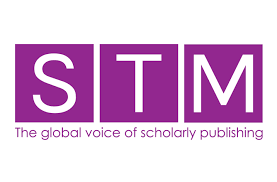 Eefke Smit, FAIRsFAIR Champion and Director of Standards and Technology at the International STM Association recently participated in a podcast interview alongside colleague Joris van Rossum, Director for Research Data. They were there to talk about the work of the Association and the priorities for digital open science, and also to comment on the FAIRsFAIR draft policy recommendations to support the realisation of a FAIR ecosystem in Europe published in February 2020.
Eefke Smit, FAIRsFAIR Champion and Director of Standards and Technology at the International STM Association recently participated in a podcast interview alongside colleague Joris van Rossum, Director for Research Data. They were there to talk about the work of the Association and the priorities for digital open science, and also to comment on the FAIRsFAIR draft policy recommendations to support the realisation of a FAIR ecosystem in Europe published in February 2020.
Highlights from the interview are reported in this article. Responses have been significantly abbreviated. For the full experience listen to the full podcast here.


Joris van Rossum, Director for Research data | Eefke Smit, Director of Standards and Technology
Q1. The Association of STM publishers has declared 2020 the STM Research Data Year. Could you tell us a little bit about the motivation behind this and briefly summarise the activities it comprises? How has the uptake of and the feedback on the “STM Research Data Year” been so far?
Joris van Rossum: The STM Research Data Year was launched to allow publications to work together to roll out the implementation of data sharing solutions and tools which have proven to be effective for some publishers and thus worthy of general adoption. Examples are the integration of data availability statements, and rolling out journal policies across journals as well as Scholix, resulting in the effective linking of journal articles and research data. The idea was that smaller and mid-sized publishers could learn from the players that are far along in implementation.
Feedback has been really positive. Eighteen publishers are currently participating in the programme representing 12 000 publications and 60% have general policies rolled out already. We are starting with implementing availability statements and articles and Scholix is implemented in 35% of cases. The STM research data website is a valuable source of information and we also have a dashboard which measures our progress.
Another motivation was coordinating and aligning our efforts to speed up implementation in a very complex ecosystem which includes policy makers, institutions, funders, repositories and researchers themselves. We need to work together very closely to bring about effective change in the ecosystem. We play a part in this - organising meetings and webinars and coordinating with various organisations - like FAIRsFAIR, another important source of collaboration.
Q2. STM publishers have recently strengthened their ties with the Research Data Alliance (RDA). In which ways do you see this helping the publishing world support FAIR data and Open Science?
Joris van Rossum: Our "Share Link Cite" focus originates in the work of the RDA and other organisations. For example data availability statements were recommended by the RDA Scholix Working group, data citation principles, and standards for repositories were also developed by the RDA. Already, RDA has done fantastic work. Going forwards, working with RDA as well as other organisations such as FAIRsFAIR and American and Asian counterparts and institutions will consolidate these successes.
Q3. From your point of view, could the FAIRsFAIR project, or other European infrastructure projects, play a particular role in the context of the STM Research Data Year?
Joris van Rossum: Absolutely! What really resonates with us is the practical aspect as practical guidelines are what journal editors and publishers are most in need of. We like that focus in FAIRsFAIR and also the European aspect - and funding brings an additional element which is interesting. We're very excited and see a lot of good work being done, including these recommendations.
Q.4 Based on the findings of a number of landscaping activities and the recommendations of the Turning FAIR into Reality report, the FAIRsFAIR project has developed a total of 22 draft Policy Enhancement Recommendations more than half of which are of interest to publishers. As a representative of a large association of scholarly publishers, what is your take on these draft recommendations overall?
Eefke Smit: The title alone Turning FAIR into Reality is completely in line with our aims for the Research Data Year. All of the recommendations are of interest to publishers because publishers play as important a part in the research ecosystem as any other stakeholders. In the research cycle the most important moments are at the start when the funding proposal is accepted and towards the end when the publication is accepted in a journal. All stakeholders should work together so that the requirements for data sharing should be seamlessly embedded in the entire process from the requirements of the research grant to all the journal requirements for publication.
The very first recommendation, "Provide practical guidance to researchers and data stewards on how to implement FAIR within different domains" exactly describes the atmosphere we're working in. And adding to what Joris has explained about the research data year, I would like to add that for STM this was quite a new thing to do because very often we talk about policies, we talk about standards, but this is one of the first times we've started a programme to give practical guidance to focus on adoption and implementation. In the research data field, so much work has gone into making all those preparations that there's a lot that is ready on the shelf to be implemented and adopted. So provide practical guidance for something that should be completely integrated in the research cycle is an area where publishers can play an important role.
Recommendations of particular importance (you can read them all here)
Recommendation 12: Working collaboratively, define and require standardised Data Accessibility Statements.
Collaboratively says it all. Data availability statements are a case in point and we've done a lot of work in that area.
Recommendation 15: Policies and related guidance should emphasise that data management planning and sharing data supports research integrity goals, enhances data quality and contributes to reproducibility and transparency.
These are all elements that are playing a more and more important role in journal policies - protecting research integrity and proving research reproducibility has become a real concern for journals and we will want to work more in this area in future as a natural part of making open science possible.
Recommendation 17: RDM support should place an emphasis on selecting which data to make and keep FAIR as well as advising on where data should be deposited.
Publishers often report that authors ask journals where to deposit their data and it would make enormous sense for us to work with other stakeholders - perhaps in the context of FAIRsFAIR or EOSC - on making it easy for reasearchers to find the trusted repositories, and making sure metadata is aligned. We've developed Scholix together with a lot of other stakeholders to be an environment where this can happen.
Recommendation 20: Provide guidance on how to cite a broader range of research outputs including data and software, as well as actors and enablers such as data managers, data stewards, funding bodies, research infrastructures and organisations.
Share Link Cite is the motto of the Research Data Year. Citing is of huge importance to incentivise authors because metrics and performance measurement should go much further than just citations to publications, for example citations to data and software.
Recommendation 22: Support stakeholders to consider compliance monitoring across the FAIR ecosystem using identifiers and knowledge graphs. An emphasis should be placed on rewarding good practice but, where necessary, the introduction of penalties for non-compliance should be considered.
This is very important. Right now we're in the encouraging stage as regards compliance but the more journals that will ask for Data Availability Statements and have clear data policies, the more necessary compliance will become. And the number of journals with data policies is currently 12 000 and growing steadily.
Q.5 Which recommendation should have the highest priority overall?
Eefke Smit: I think the key is practicality so my choice is the first recommendation. If we focus on adoption and implementation of data sharing for a good while that would be a good achievement. We should concentrate on just doing it.
Q.6 Are there any topics or measures missing that you deem relevant?
Joris van Rossum: The motivational aspect should not be forgotten. Researchers understand the power and importance of data sharing from the perspective of data integrity and reproducibility and also for its potential to speed up scientific progress. However they have obvious concerns about being scooped. If the reward systems continue to articulate around citations and number of publications, they cannot incentivise data sharing. As an ecosystem we need to ensure that researchers are rewarded and performance measurement is appropriately calibrated to reflect the importance of and encourage research data sharing. That's not easy but citing and linking are important ingredients to consider in measuring performance.
On a more practical level we're taking the first steps in review of research data. Traditional peer review is essentail in the scientific process and ensures the quality of output but also that the right information is published in the right outlets. Data is more complex than a research article however since it can mean a lot of things in different scientific areas. In the arts and social sciences in particular, data is often not clearly defined. The first step is to think about what peer review could mean and identify the steps to be followed to add value to the ecosystem. It's complex though.
In terms of how researchers might be rewarded, we need to think about the entire research cycle. Citations are probably not enough so it might be that depositing the research data could be a research output that adds value. Research data management plans should be a requirement. Due to the complexities this is something we need to think of as an entire ecosystem.
Eefke Smit: Joris makes a good point about the data peer review. It's a very thorny issue and often avoided in research data discussions. When sharing has become a more common practice, all of us need to dig into the data more deeply. For example, checking and evaluating the data underlying a piece of research and understanding what may have happened during the processing phase is vital. To make a start we could introduce transparency as to what exactly in data has been checked - simple curation steps based on a tiered system and a taxonomy still to be agreed and established. Another option is an open rating system. This is definitely a topic that merits more attention and a community approach.
Q7. How could FAIRsFAIR support publishers (and journals) in implementing the recommendations?
Joris van Rossum: Research data sharing is more important than ever. A key question is how to support the practical aspect for busy publishers. Publishers and editors need practical tools and guidance as to how to implement research data sharing. This is where FAIRsFAIR can make a real contribution.
The discussion was full, rich and wide-ranging and FAIRsFAIR thanks our first guests in the podcast series for their availability and their valuable contributions!


